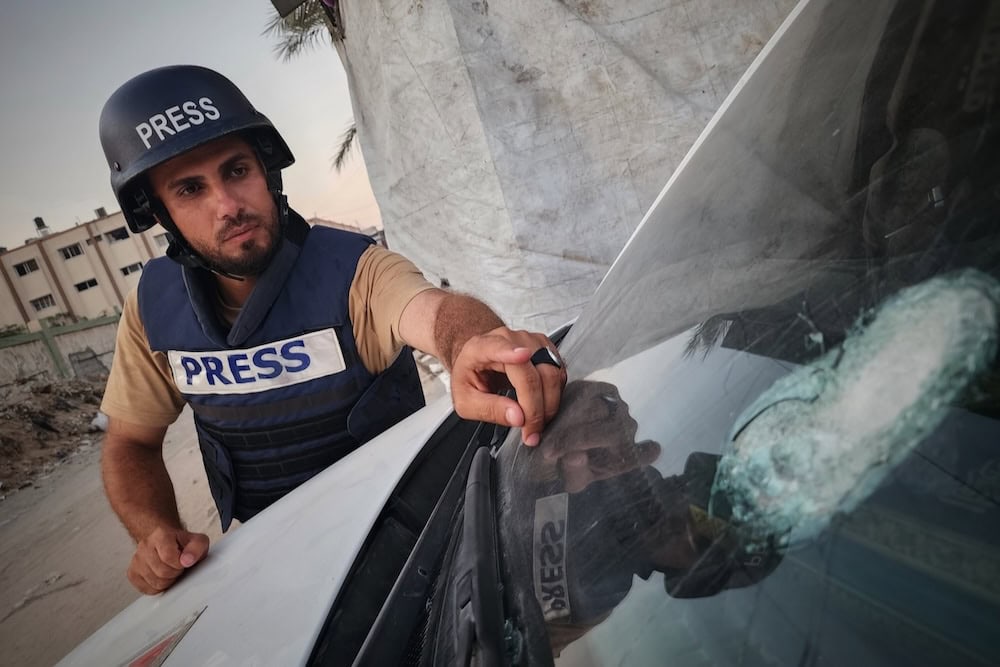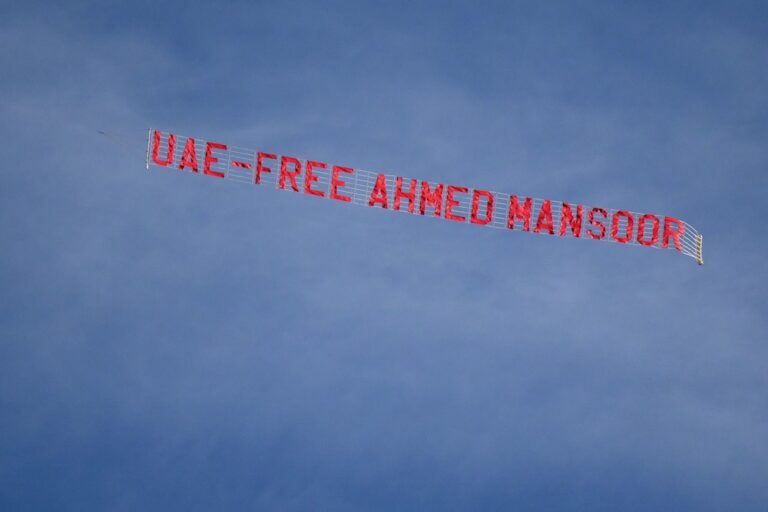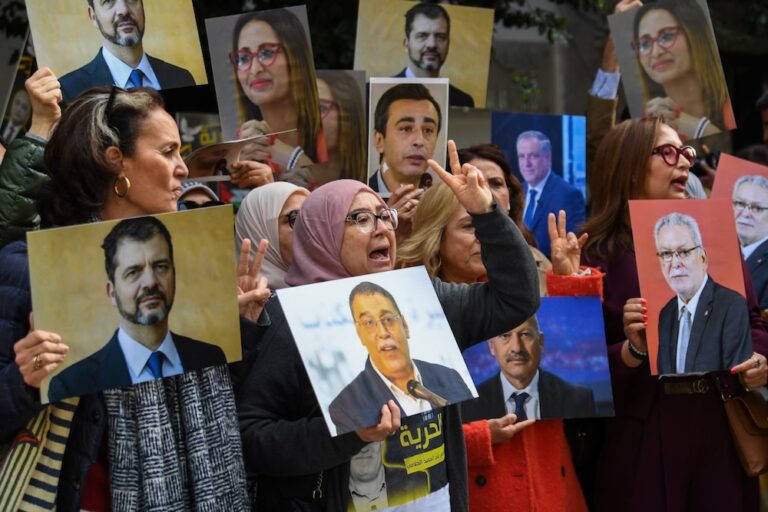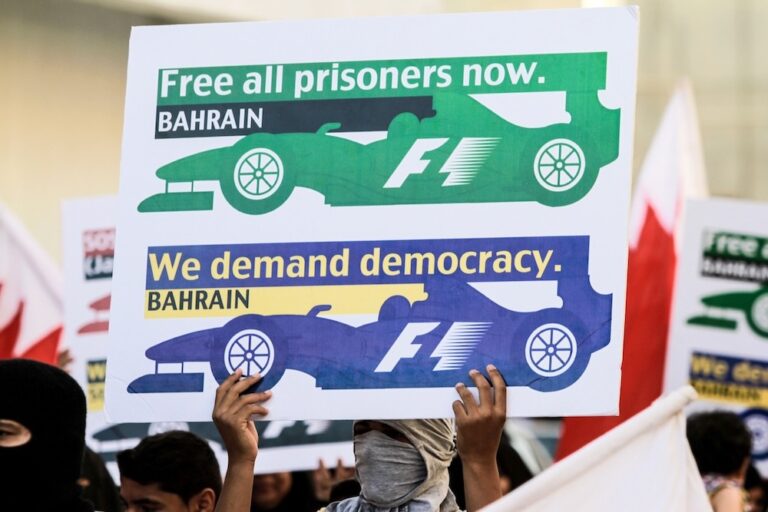August 2024 in MENA: A free expression and civic space round-up produced by IFEX’s Regional Editor Naseem Tarawnah, based on IFEX member reports and news from the region.
Palestinian journalists continue to be targeted with impunity, while online harassment of Palestinian youth drives self-censorship, Iran executes critics, Egypt jails activists, and Tunisia’s election dismissed as a “bad farce”.
Palestine: Silencing the messengers and surveillance fuels self-censorship
The situation for journalists in Palestine continues to deteriorate to unprecedented levels, with reports of deliberate targeting and killings by Israeli forces in Gaza and beyond. On 18 August, freelance reporter Ibrahim Muhareb was killed and his colleague Salma al-Qaddoumi was wounded when an Israeli tank opened fire on a group of journalists in Gaza wearing press vests.
The attack came days after Al Jazeera journalist Ismail al-Ghoul and photographer Rami al-Rifi were killed after their car was hit by an Israeli missile strike. They had been reporting live from the al-Shati refugee camp.
Al-Ghoul and Al-Rifi were some of the latest Palestinian journalists that Israel has accused of being members of Hamas, based on evidence Al Jazeera called “baseless”. The media network has called for an independent international investigation into the killing of its staff since the start of Israel’s war on Gaza.
The Committee to Protect Journalists (CPJ) called on Israel to stop smearing killed Palestinian journalists with unsubstantiated “terrorist” labels that have been widely condemned as part of a broader effort to silence Palestinian journalists and undermine reporting from Gaza. “Smear campaigns endanger journalists and erode public trust in the media. Israel must end this practice and allow independent international investigations into the journalists’ killings,” said CPJ Program Director Carlos Martínez de la Serna.
IFEX member the Palestinian Center for Development and Media Freedoms (MADA) also condemned the deliberate killings and called on the international community to acknowledge its failure to protect journalists in Gaza. MADA underscored Israeli impunity as a major factor in the escalating crimes against Palestinian journalists and media outlets.
Popular TikToker Medo Halimy, known for documenting life in Gaza, was also killed last month by shrapnel from an Israeli airstrike.
In addition to the physical violence and its staggering toll on journalists and civilians, Palestinians continue to face digital security threats. Studies by IFEX member the Arab Center for the Advancement of Social Media (7amleh) revealed that online harassment and cyber surveillance of young Palestinians have sparked a chilling rise in self-censorship.
According to one study 70% of young Palestinian citizens of Israel practise online self-censorship and avoid using the Internet as a tool for mass activism. In the Occupied West Bank and Jerusalem, 60% of Palestinian youth respondents there expressed similar sentiments, with Israel’s strict surveillance and legal prosecution of online activity of Palestinians reinforcing the climate of fear.
Meta has struggled to moderate content related to Israel and Palestine on its various platforms, particularly in the Hebrew language. Internal documents and a former employee revealed the social media company’s policies governing hate speech as it pertains to Palestine are inequitable, and that the company lacks the same processes in place to gauge the accuracy of moderation of Hebrew content and Arabic content. 7amleh’s racism and incitement index recorded over 10 million instances of violent content in Hebrew last year, with Facebook accounting for 23.6% of violent content.
Recent investigations have exposed the role of tech giants like Amazon, Google, and Microsoft in enabling Israel’s human rights abuses, raising concerns about their complicity in the occupation’s surveillance and violence. These companies have provided services such as cloud storage and AI tools to the Israeli military, including Unit 8200, which has developed and deployed surveillance technologies that have been criticised for their inaccuracy and high potential to target civilians.
Iran’s alarming surge in executions and repression
Iran has witnessed a disturbing surge in executions and repression in recent months, with at least 87 people reportedly executed in the weeks following the June presidential election.
Among the executed was Reza Rasaei, a 34-year-old Kurdish man who was arrested during the 2022 nationwide “Women, Life, Freedom” protests. Rasaei was sentenced to death for his alleged role in the “premeditated murder” of a security official in a trial based on forced “confessions”, amidst reports that he was subjected to torture and other ill-treatment in detention.
Iran has seen a significant escalation in the use of capital punishment, with a reported 853 executions in 2023 and at least 274 more carried out by 30 June 2024. Alarmingly, Amnesty International notes that the death penalty has been disproportionately applied to Iran’s Baluch ethnic minority, who comprise only 5% of the population yet account for 20% of recorded executions, highlighting a disturbing trend of targeted persecution.
Since the 2022 protests following Mahsa Jhina Amini’s death, the number of women sentenced to death has increased. Labour activist Sharifeh Mohammadi was sentenced to death on a charge of “armed rebellion against the state,” while Kurdish political activist Pakhshan Azizi was sentenced to death for alleged membership in opposition groups.
Rights groups have called for a moratorium on executions and judicial reforms to ensure fair trials and due process. The new Iranian president, Masoud Pezeshkian, has been urged to take immediate action to address the country’s human rights crisis.
Hopes that the country may see some progress on human rights issues remain tempered following a heavily boycotted election that brought Pezeshkian to power. While Iran’s hardline parliament approved the new president’s reformist cabinet ministers for the first time since 2001, authorities have yet to demonstrate an intent to end impunity for the egregious injustices inflicted, particularly on the activists, women, and ethnic minorities that continue to face execution for their free expression.
Tunisia’s “bad farce” of an election
Civic space in Tunisia has been marked by escalating repression as the country approaches its October presidential elections. President Kais Saied, who has steadily consolidated power since his 2021 takeover, faces criticism for undermining democratic processes, including restructuring the electoral commission to serve under presidential control.
Out of 17 potential contenders, only three were approved by the commission, including Saied. In recent weeks, several disqualified potential candidates have faced criminal convictions seen as politically motivated, including lifetime bans from running for elections.
“After jailing dozens of prominent opponents and activists, Tunisian authorities have removed almost all serious contenders from the presidential race, reducing this vote to a mere formality,” said Bassam Khawaja of Human Rights Watch (HRW).
Former presidential hopeful Safi Said was released from custody last month after a four-month sentence in June. A prominent government critic, Said dropped out of the election, calling it a “bad farce” in an online statement that underscored the “inequality of opportunity, high obstacles and a lack of clarity in the rules” for prospective candidates.
A court also dismissed a case against journalist Walid Mejri, director of independent media outlet Al-Katiba, after he challenged a one-year jail sentence handed down in January 2023 on charges of “allegedly misusing public communication networks” for his online posts critical of key government figures.
Meanwhile, the country’s electoral commission revoked journalist Khaulia Boukrim’s accreditation to cover the upcoming election. The National Syndicate of Tunisian Journalists rejected the decision, saying it was intended to silence criticism and that it would be appealing.
Egypt’s war on dissent continues
Egyptian authorities continued their crackdown on dissent in August, with a spate of free speech prosecutions. Recent initiatives to amend the maximum duration of pretrial detention have been met with scepticism by rights groups, who argue that reducing the length of pretrial detention is futile without addressing the underlying issues of judicial independence and the misuse of pretrial detention as a retaliatory measure.
On 1 August, former spokesperson of the Civil Democratic Movement (CDM) Yehia Hussein Abdel Hady was arrested from his car after publishing a social media post criticising the state, the political opposition, and the leaders of the Armed Forces. According to Mada Masr, Abdel Hady was handed a 15-day detention order pending investigations into charges of joining a terrorist organisation, misusing social media platforms, broadcasting and publishing false news, and financing and inciting terrorism.
Many of those same charges were levied against 35 people who appeared at the Supreme State Security Prosecution headquarters on 18 August after periods of enforced disappearance. They were detained for 15 days pending investigations.
Authorities also targeted independent cultural organisations, with security forces raiding the headquarters of ElMaraya for Culture and Arts on 27 July. The company’s founder was arrested, and several books and cultural publications were seized during the raid. IFEX member the Association for Freedom of Thought and Expression (AFTE) condemned the raid on ElMaraya as part of a broader pattern of security policies restricting creative and artistic expression in Egypt.
Furthermore, the Ministry of Interior has been urged to protect the safety of political activist and poet Ahmed Douma, who has been targeted by pro-government preachers accusing him of infidelity, insanity, and apostasy over his poetry collection “Curly”. These accusations threaten Douma’s life, and rights groups have warned against prosecuting him under the pretext that he disdains Islam.
In brief
UN experts have urged Bahrain to address dire conditions in Jau prison, where prisoner protests have resulted in worse treatment. Since March 2024, detainees have been denied essential medical care, adequate food, and safe drinking water, with reports of air conditioning being cut off, exposing prisoners to extreme heat.
The experts warned that such conditions could constitute torture, stating that “lowering standards as a form of punishment when prisoners exercise their legitimate rights to complain is not appropriate.” They called on the government to restore humane conditions and engage in meaningful dialogue with prisoners and their families.
In Iraqi Kurdistan, a suspected Turkish drone strike on 23 August killed journalists Gulistan Tara and Hero Bahadin and injured video editor Rebin Bakir. The three, working for Chatr Multimedia Production Company, were on a reporting mission at the time. “Turkish authorities should swiftly investigate this attack and determine if the reporting team was targeted for their work,” said CPJ’s Yeganeh Rezaian. The strike is part of Turkey’s intensified operations against the PKK in the Kurdistan region.
Gulf states are intensifying their crackdown on free speech, using vague counter-terrorism and cybercrime laws to silence critics under the pretext of protecting strategic interests and national security, reports IFEX member Social Media Exchange (SMEX). The digital rights group highlighted recent cases in the region, including Saudi Arabia sentencing Professor Asaad Al-Ghamdi to 20 years in prison for social media posts, and Kuwait imprisoning former MP Walid Al-Tabtabai for criticising the Emir’s dissolution of parliament in May. SMEX also highlighted cases in the UAE where dozens have been summoned and deported without charges for their social media posts criticising Israel’s genocide in Gaza.



